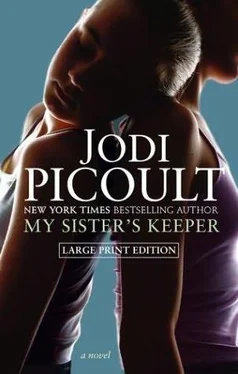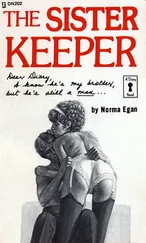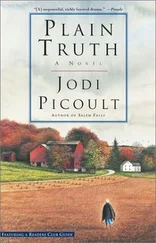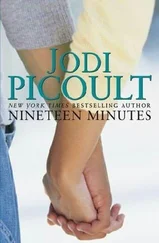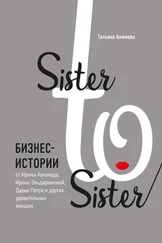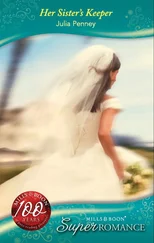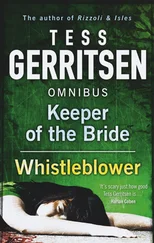"But we're late."
I shrug. "Who's counting?"
Judge DeSalvo is not a happy man; Anna's little field trip this morning has cost us an hour and a half. He glares at me when Judge and I hurry into his chambers for the pretrial conference. "Your Honor, I apologize. We had a veterinary emergency."
I feel, rather than see, Sara's mouth drop open. "That's not what opposing counsel indicated," the judge says.
I look DeSalvo right in the eye. "Well, it's what happened. Anna was kind enough to help me by keeping the dog calm while the sliver of glass was removed from his paw."
The judge is dubious. But there are laws against handicapped discrimination, and I'm playing them to the hilt; the last thing I want is for him to blame Anna for this delay. "Is there any way of resolving this petition without a hearing?" he asks.
"I'm afraid not." Anna may not be willing to share her secrets, which I can only respect, but she knows that she wants to go through with this.
The judge accepts my answer. "Mrs. Fitzgerald, I take it you're still representing yourself?"
"Yes, Your Honor," she says.
"All right then." Judge DeSalvo glances at each of us. "This is family court, Counselors. In family court, and especially in hearings like these, I tend to personally relax the rules of evidence because I don't want a contentious hearing. I'm able to filter out what is admissible and what is not, and if there's something truly objectionable, I'll listen to the objection, but I would prefer that we get through this hearing quickly, without worrying about form." He looks directly at me. "I want this to be as painless as possible for everyone involved."
We move into the courtroom—one that's smaller than the criminal courts, but intimidating all the same. I swing into the lobby to pick Anna up along the way. As we cross through the doorway, she stops dead. She glances at the vast paneled walls, the rows of chairs, the imposing bench. "Campbell," she whispers, "I won't have to stand up there and talk, right?"
The fact is, the judge will most likely want to hear what she has to say. Even if Julia comes out in support of her petition, even if Brian says he will help Anna, Judge DeSalvo may want her to take the stand. But telling her this right now is only going to get her all worked up—and that's not any way to start a hearing.
I think about the conversation in the car, when Anna called me a liar. There are two reasons to not tell the truth—because lying will get you what you want, and because lying will keep someone from getting hurt. It's for both of these reasons that I give Anna this answer. "Well," I say, "I doubt it."
"Judge," I begin, "I know it's not traditional practice, but there's something I'd like to say before we start calling witnesses."
Judge DeSalvo sighs. "Isn't this sort of standing on ceremony exactly what I asked you not to do?"
"Your Honor, I wouldn't ask if I didn't think it was important."
"Make it quick," the judge says.
I stand up and approach the bench. "Your Honor, all of Anna Fitzgerald's life she has been medically treated for her sister's good, not her own. No one doubts Sara Fitzgerald's love for all her children, or the decisions she's made that have prolonged Kate's life. But today we have to doubt the decisions she's made for this child."
I turn, and see Julia watching me carefully. And suddenly I remember that old ethics assignment, and know what I have to say. "You might remember the recent case of the firefighters in Worcester, Massachusetts, who were killed in a blaze started by a homeless woman. She knew the fire had started and she left the building, but she never called 911 because she thought she might get into trouble. Six men died that night, and yet the State couldn't hold this woman responsible, because in America—even if the consequences are tragic—you are not responsible for someone else's safety. You aren't obligated to help anyone in distress. Not if you're the one who started the fire, not if you're a passerby to a car wreck, not if you're a perfectly matched donor."
I look at Julia again. "We're here today because there's a. difference in our system of justice between what's legal and what's moral. Sometimes it's easy to tell them apart. But every now and then, especially when they rub up against each other, right sometimes looks wrong, and wrong sometimes looks right." I walk back to my seat, and stand in front of it. "We're here today," I finish, "so that this Court can help us all see a little more clearly."
My first witness is opposing counsel. I watch Sara walk to the stand unsteadily, a sailor getting her sea legs again. She manages to get herself into the seat and be sworn in without ever breaking her gaze away from Anna.
"Judge, I'd like permission to treat Mrs. Fitzgerald as a hostile witness."
The judge frowns. "Mr. Alexander, I truly would hope that both you and Mrs. Fitzgerald can stand to be civilized, here."
"Understood, Your Honor." I walk toward Sara. "Can you state your name?"
She lifts her chin a fraction. "Sara Crofton Fitzgerald."
"You are the mother of the minor child Anna Fitzgerald?"
"Yes. And also of Kate and Jesse."
"Isn't it true that your daughter Kate was diagnosed with acute promyelocytic leukemia at age two?"
"That's right."
"At that time did you and your husband decide to conceive a child who would be genetically programmed to be an organ donor for Kate, so that she could be cured?"
Sara's face hardens. "Not the words I would choose, but that was the story behind Anna's conception, yes. We were planning to use Anna's umbilical cord blood for a transplant."
"Why didn't you try to find an unrelated donor?"
"It's much more dangerous. The risk of mortality would have been far higher with someone who wasn't related to Kate."
"So how old was Anna when she first donated an organ or tissue to her sister?"
"Kate had the transplant a month after Anna was born."
I shake my head. "I didn't ask when Kate received it; I asked when Anna donated it. The cord blood was taken from Anna moments after birth, isn't that right?"
"Yes," Sara says, "but Anna wasn't even aware of it."
"How old was Anna the next time she donated some body part to Kate?"
Sara winces, just as I have expected. "She was five when she gave donor lymphocytes."
"What does that involve?"
"Drawing blood from the crooks of her arms."
"Did Anna agree to let you put a needle in her arm?"
"She was five years old," Sara answers.
"Did you ask her if you could put a needle in her arm?"
"I asked her to help her sister."
"Isn't it true that someone had to physically hold Anna down to get the needle in her arm?"
Sara looks at Anna, closes her eyes. "Yes."
"Do you call that voluntary participation, Mrs. Fitzgerald?" From the corner of my eye I can see Judge DeSalvo's brows draw together. "The first time you took lymphocytes from Anna, were there any side effects?"
"She had some bruising. Some tenderness."
"How long was it before you took blood again?"
"A month."
"Did she have to be held down that time, too?"
"Yes, but—"
"What were her side effects then?"
"The same." Sara shakes her head. "You don't understand. It wasn't like I didn't see what was happening to Anna, every time she underwent a procedure. It doesn't matter which of your children you see in that situation—every single time, it breaks you apart."
"And yet, Mrs. Fitzgerald, you managed to get past that sentiment," I say, "because you took blood from Anna a third time."
"It took that long to get all the lymphocytes," Sara says. "It's not an exact procedure."
"How old was Anna the next time she had to undergo medical treatment for her sister's well-being?"
Читать дальше
